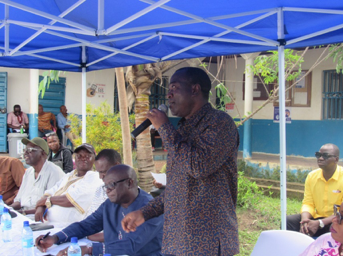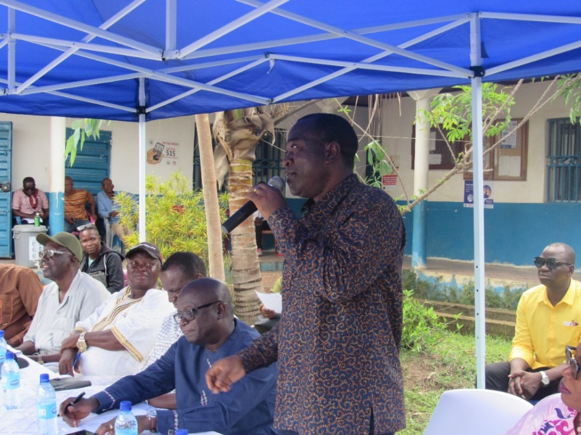
United Nations Resident Coordinator, Mr Babatunde Ahonsi, has said that with robust partnerships, the UN System, the Government, and the people of Kono could work together to address some of the development challenges facing the diamond-rich district.
He made these remarks during the official handover of agricultural equipment and inputs to farmers from three out of the fourteen chiefdoms in the district. Soa, Gbense and Kamara chiefdoms were the beneficiaries of a pilot Human Security Trust Fund-supported project being implemented by UNDP and FAO since 2021 to enhance progress towards the SDGs in these communities.
Accompanied by UNDP Resident Representative, Mr Pa Lamin Beyai, the RC said that though historically, Kono has been richly endowed with mineral and agricultural resources, its development indicators were below the national averages. “The development of the district is in stark contrast to its endowments,” he said.
Furthermore, the RC emphasised that “the district’s relative remoteness and the persistence of several development challenges further compounded by conflicts have plagued growth and productivity.”
Mr Ahonsi said he believes that the handover event will complement the work that the UN System has started with the rehabilitation of the Inland Valley Swamps. The tools and equipment will enable increased food production for the community and beyond. He expects these interventions to be owned by the communities’ stakeholders and beneficiaries and a model for other communities to replicate and address longstanding development challenges.
UNDP Programme Specialist, Ms Josephine Scott-Manga, said it was a multi-faceted/dimensional methodology to address complex development challenges in her overview of the human security approach. “It provides a comprehensive response by crafting interventions that speak to social, economic, environmental, community security, cohesion and peace,” she remarked. Ms Scott-Manga noted that the approach also emphasised that women, youth, and people with disability are placed at the heart of decision making.
A representative of the Political Parties Registration Commission (PPRC) said the programme through the District Multi-Party Forum had contributed immensely to mutual understanding between and among political leaders in the communities.
Chair of the Council of Paramount Chiefs Emmanuel T. Foryoh assured UNDP and FAO of the programme’s success in all chiefdoms, promising that they will not be let down.
The programme recipients said the intervention would change the lives of the rural communities, that it was timely, that livelihoods have improved, and that peace has been established in their communities.
In his keynote address, Minister of Local Government and Rural Development, Mr Tamba Lamina, thanked UNDP and FAO for their engagements with the three chiefdoms of Gbense, Sao and Kamara, stressing that working together breeds peace and better development outcomes.
He said he was highly impressed by the testimonies of the recipients that the programme is going in the right direction. “If the programme succeeds, it will be used as a model in other parts of the country, and the other chiefdoms in Kono will benefit, “the Minister said.
The recipients from the three chiefdoms received three sets of rice milling machines, six tricycles, three sets of cassava grater machines, six storage solar freezers, six electronic scales, six motorbikes, and three hundred bags of fertilizers as part of the first set of items given to them.
UN Sierra Leone worked closely with the Ministries of Local Government and Agriculture to attract the Human Security Trust funding to strengthen human security and resilience in remote communities in the three chiefdoms for a two-year project.




